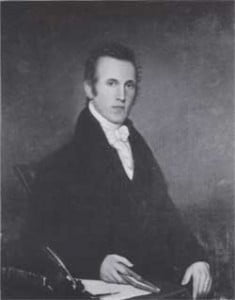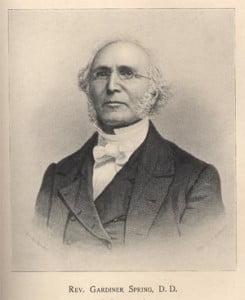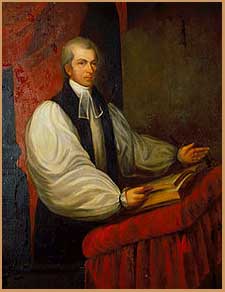George Washington was born on February 22, 1732. You may have noticed postings on Facebook and elsewhere with recommended readings in commemoration of the occasion. Peter Lillback’s somewhat recent work, George Washington’s Sacred Fire, should be among that list. But it was on this day, February 23, in 1862, that the Rev. T.W.J. Wylie, a Reformed Presbyterian pastor (General Synod) brought the following message:—
Washington a Christian.
A Discourse preached February 23, 1862, in the First Reformed Presbyterian Church, Philadelphia.
by the Pastor, T. W. J. Wylie.
(Philadelphia: William S. & Alfred Martien, 606 Chestnut Street, 1862.)
“According to Thy manifold mercies Thou gavest them saviours, who saved them out of the hand of their enemies.” — Nehemiah ix. 27.
Why was yesterday, throughout our land, such a day of gladness? It was because, in the arrangements of Divine Providence, a succession of victories which had crowned our arms, was connected, by a delightful coincidence with the recurrence of the birthday of the patriot, the hero, the statesman, who, by universal consent, bears the honoured name of Father of His Country. It was well for us, with gratitude to Heaven, to observe the day; and while reflecting on the evidences which the past presented, that the Lord our God was with us, to gather hope and courage for the future.
It is proper for any nation to cherish the memory of those who have been its deliverers or benefactors. In one of the sacred Psalms (lxxxvii. 4) we have been singing, the inspired writer refers to Rahab, or Egypt, and Babylon, as distinguished for their great men. Ethiopia, also, then, as now, perhaps, despised by many, is not forgotten—”this man was born there.” But it is when the honours which may be accorded to any one, for the natural greatness which he may attain, are connected with the higher glory of a Christian life, that we find an object worthy of our chief admiration. “It shall be said of Zion, This and that man was born in her; and he that is the Highest himself shall establish her. The Lord shall count when he writeth up the people, that this man was born there. Selah. As well the singers, as the players on instruments, shall be there. All my springs are in thee.”
It is in this aspect then, especially, that we think it proper, to-day, to review the character of that illustrious man, whom our nation delights to honour. We do, indeed, think it would be unsuitable to introduce into this holy place what was purely political; and we consider it highly improper that any should substitute the reading of Washington’s Farewell Address for the usual exposition of divine truth; but we do think it is perfectly appropriate that we consider the illustration which the history of our country, and the life of Washington afford, of the language of our text: God, “according to His manifold mercies, has given us saviours, who have saved us out of the hand of our enemies.” Such men were Washington, and others, and it is proper for us to acknowledge, with gratitude, the manifold mercies of that gracious Being who raised them to save us from the hand of our enemies.
In thus referring to the history of Washington, we invite your attention, first, to his early life. We desire, naturally, to trace a mighty river to itds fountain; and as we notice how it gushes from the mountain-side, in some dark glen, almost entirely concealed from view; and as we trace its widening, deepening course, till it swells into the majestic stream, which floats a navy on its bosom, we admire the more the grandeur of a development so great, from a beginning so small. We ask what influences have produced such a result. So in the career of great men—so in the history of Washington. One of our first inquiries is, What was he when a child? How was formed then that noble character, which has gained him a place so exalted in the annals of our race?
We may notice, first of all, that he enjoyed the blessing of pious parents. His father, who died when his son was only about ten years old, was a religious man, and appears to have had a profound sense of the Divine existence and excellence, which he endeavoured to impress on the tender heart of his child. His mother, too, was a consistent Christian, and carefully brought up her children “in the nurture and admonition of the Lord.” It is related of her daughter, that when parting with a son, as he first left his home, she gave him, as her farewell charge, “My son, never neglect the duty of secret prayer.” Washington, we doubt not, was early taught to pray; and from a child, he knew of the Holy Scriptures. Indeed, there is reason to believe that from a very early age he was a subject of regenerating and sanctifying grace. His case is one of many which prove the faithfulness of the divine promise: “Train up a child in the way he should go, and when he is old he will not depart from it.”
One of the principal features of his character was filial obedience. He was remarkable for the respect which he always showed his widowed mother. When quite a young man, a commission was obtained for him to enter the British Navy as a midshipman. His mother had given a reluctant assent, and all the necessary arrangements had been made. The vessel was lying in the Potomac to receive him on board; his baggage was ready; he was just going to say farewell, when he observed that his mother’s heart was grieved, and he resolved to remain. The firm spirit which never quailed before a foe, was bowed by a mother’s love. His whole career was changed. Had it not been that he was thus influenced, how different would have been his subsequent history, and ours!
Such was his general, we doubt not but we may say, his uniform character. When some one, after the great victory which terminated our Revolutionary War, hastened to announce the tidings to his mother, her reply was simply, “George was always a good child.” We question if any of the honours which were heaped upon him were more grateful than this praise from the lips of her whom he so much loved and revered.
He displayed in youth an intrepidity which foretokened the courage he afterwards manifested. The traveller who visits the Natural Bridge in Virginia may notice how one person and another, desirous of leaving a record of his existence, has climbed up its almost perpendicular sides and carves his name on the soft rock. High up above the rest is the name of Washington—the steady heart, the firm hand, the strong foothold of the boy, corresponding to the character of the man.
His habits of system and industry were remarkable from early life. In the language of an old writer, he “endeavoured to live by rule, and therefore had a rule to live by.” When he was about thirteen years of age he prepared a blank book to make a record of such things as he considered worthy of especial remembrance. Among other articles entered in this book we find a number of rules of conduct for the young. Some of these indicate the leading elements of his future character. “When you speak of God or his attributes, let it be seriously in reverence.” “Labour to keep alive in your breast that little spark of celestial fire called conscience.” “Be no flatterer.” “Show not yourself glad at the misfortune of another, though he were your enemy.” “Let your conversation be without malice or envy.” “Detract not from others, neither be excessive in commending.” “Undertake not what you cannot perform, but be careful to keep your promise.” “Let your discourse with men of business be short and comprehensive.” “When you meet with one of greater quality than yourself, stop and retire, especially if it be at a door or any straight place, to give way for him to pass.” “In your apparel be modest, and endeavor to accommodate nature rather than to procure admiration.” “Play not the peacock, looking everywhere about you, to see if you be well-decked; if your shoes fit well, if your stockings sit neatly, and clothes handsomely.” One of the books which belonged to his mother, and which was found in his own library, having evidences of frequent use, was the writings of Sir Matthew Hale; and there is reason to believe that the valuable counsels which it contains were enjoined by his mother, and adopted by himself, for the regulation of his life.
His love of truth is shown by incidents in his history which are as familiar to all Americans as household words. His sense of justice, his impartiality and decision of character were conspicuous even when he was a child. His companions had such confidence in him that they were in the habit of calling on him to settle their disputes. Although naturally courageous, he would neither fight with his schoolmates himself, nor allow them to fight with each other, and braving their displeasure, he would inform the teacher in order to prevent such combats.
But we pass to consider his character as he entered upon public life—as the soldier and the statesman—in both the Christian.
To continue reading this discourse, click here.
 Born in Newburyport, Massachusetts on February 24, 1785, Gardiner Spring attended Berwick Academy in Maine. He then went to and graduated from Yale University in 1805. Married the following year, he and his new bride Susan moved to Bermuda where Gardiner Spring taught the classics and mathematics. This was only for some income, as his real purpose was to study law. And he was admitted to the bar in New Haven, Connecticut in 1808. Receiving a call to the ministry, he went to Andover Theological Seminary for one year and was called to the Brick Presbyterian Church in New York City in 1810, never to leave its pulpit.
Born in Newburyport, Massachusetts on February 24, 1785, Gardiner Spring attended Berwick Academy in Maine. He then went to and graduated from Yale University in 1805. Married the following year, he and his new bride Susan moved to Bermuda where Gardiner Spring taught the classics and mathematics. This was only for some income, as his real purpose was to study law. And he was admitted to the bar in New Haven, Connecticut in 1808. Receiving a call to the ministry, he went to Andover Theological Seminary for one year and was called to the Brick Presbyterian Church in New York City in 1810, never to leave its pulpit. “Still in this world of hope! In defiance of all sins of the past years, and a guilty life, I am permitted to see another birthday. I have been often surprised that I am suffered to live. Blessed be God, I am not afraid to die, and often more afraid to live. I am an abject sinner, and it will indeed be wonderful grace if I ever sit down with Christ at the Supper of the Lamb. That grace is my strong refuge; Calvary is my hiding place. I hope in the grace and guardianship and faithfulness of that omnipotent Redeemer, to be kept from falling and presented faultless before the presence of his glory with exceeding joy. This text has often comforted me, when I have been afraid of trusting in the divine mercy. ‘The Lord taketh pleasure in them that fear him, in those that hope in his mercy.’ It affords me unutterable pleasure to feel that I am not denied the privilege of laying my own soul beneath the droppings of the same blood I have for nine years recommended to my dying and guilty men.”
“Still in this world of hope! In defiance of all sins of the past years, and a guilty life, I am permitted to see another birthday. I have been often surprised that I am suffered to live. Blessed be God, I am not afraid to die, and often more afraid to live. I am an abject sinner, and it will indeed be wonderful grace if I ever sit down with Christ at the Supper of the Lamb. That grace is my strong refuge; Calvary is my hiding place. I hope in the grace and guardianship and faithfulness of that omnipotent Redeemer, to be kept from falling and presented faultless before the presence of his glory with exceeding joy. This text has often comforted me, when I have been afraid of trusting in the divine mercy. ‘The Lord taketh pleasure in them that fear him, in those that hope in his mercy.’ It affords me unutterable pleasure to feel that I am not denied the privilege of laying my own soul beneath the droppings of the same blood I have for nine years recommended to my dying and guilty men.”
 Originally a lawyer (and cousin of an early President), the clergyman James Madison (1749-1812) had high academic potential (even teaching philosophy and math at the College of William and Mary) and was ordained to the Anglican ministry in 1775. Shortly thereafter he was appointed to the presidency of William and Mary, where he served until 1812. He was consecrated at Canterbury in 1790 to become the first American born bishop of Virginia.
Originally a lawyer (and cousin of an early President), the clergyman James Madison (1749-1812) had high academic potential (even teaching philosophy and math at the College of William and Mary) and was ordained to the Anglican ministry in 1775. Shortly thereafter he was appointed to the presidency of William and Mary, where he served until 1812. He was consecrated at Canterbury in 1790 to become the first American born bishop of Virginia.